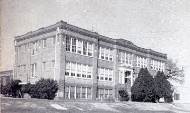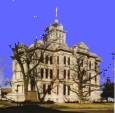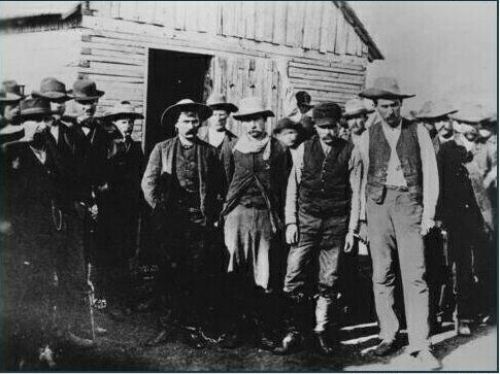Milam County Historical Commission
Milam County, Texas
Milam County, Texas






All articles from the Temple Daily Telegram are published with the permission of the
Temple Daily Telegram.
All credit for this article goes to
Jeanne Williams and the Temple Daily Telegram
Temple Daily Telegram.
All credit for this article goes to
Jeanne Williams and the Temple Daily Telegram
Milam County lawman who turned outlaw was lynched for bank robbery
by Jeanne Williams
Temple Daily Telegram - July 12, 2010
Texas lawman turned desperado William Sherod Robinson has remained a lesser known but
one of the most unusual characters of the American West.
Robinson, who terrorized Central Texans as an armed robber, was wearing the tin star
in Caldwell, Kan., when he willingly backslid into crime. The noose of an angry lynch
mob took his life as he begged for mercy.
Ironically, eight years earlier in Milam County, Robinson breached the public’s trust
when as a deputy sheriff he readily surrendered the jail to angry vigilantes seeking
to accelerate justice against a gallows-bound black man convicted of a heinous murder,
as told in a new book “William Sherod Robinson, Alias Ben Wheeler,” written by Len
Gratteri of Sisters, Ore., Rod Cook of Caldwell, Kan., and James Williams of Milano.
Consistent with Wheeler’s lack of fame is the scarcity of information written about
his early years. Brief references to Wheeler in Old West publications usually contain
recurring errors about his background. Following his lynching for involvement in the
botched bank robbery April 30, 1884, at Medicine Lodge, Kan., Wheeler’s Texas
connections were brought to light by various newspapers and the National Police
Gazette. Articles revealed that Wheeler had a wife and children in Texas.
Further mention was made of two brothers and a sister living in Milam County, and a
third brother who had worked for the Texas General Land Office in Austin. Robinson was
the crooked offshoot of the respected family.
Orphaned at age 16, William lived in the San Andres community near Rockdale with his
brother and sister-in-law, working as a farm laborer, and later becoming a deputy in
the 1870s for Milam County Sheriff William E. Mitchusson.
During Robinson’s tenure, outlaws John Wesley Hardin, Bill Longley and Sam Bass roamed
through Central Texas. While serving as a deputy, William Robinson met Longley at
least once when the outlaw was in jail.
Robinson’s brief job as a Milam County deputy sheriff was mostly uneventful. There is
no record of him killing anyone, shooting anyone or participating in a gunfight. His
career was distinguished by a cowardly act that led to one of the darkest chapters in
Milam County history — vigilante justice at its most terrifying degree.
An escaped convict, Anthony Smith, alias Anthony Williams, was convicted in a Milam
County District Court for the Jan. 11, 1876, eye-witnessed brutal murder and robbery
of Bell County farmer John M. Baker near Rockdale. Multitudes converged on the Milam
County courthouse to see the trial.
A jury found Smith guilty and sentenced the black man to death by hanging in 30 days.
Spectators praised the verdict, but not the delayed execution. As Smith remained
locked up in the new Milam County Jail, crowds were demanding immediate justice.
Entrusted with the keys, Robinson opened the jail door shortly after midnight when the
mob surrounded the building and demanded the prisoner. Leaders rushed inside, taking
Robinson’s firearm and jail cell keys, according to the book.
Smith was placed on a horse and escorted to a mesquite thicket about two miles north
of Cameron, where he was tied to trees and burned alive. The mob’s act of vengeance
raged throughout the night. The incident received nationwide publicity and was
condemned by most, but the perpetrators were never identified.
Some believed the mob consisted of Baker’s friends and relatives from Bell County who
wanted reprisal for the brutal shotgun killing. Mitchusson was voted out of office the
following month, and the new sheriff, Mitt Livingston, apparently did not retain
Robinson as a deputy.
Yet in late 1877, Robinson was documented as serving as Livingston’s deputy, but seems
to have resigned sometime during the next year.
After an unsuccessful attempt at farming, Robinson turned to a life of crime. By the
summer of 1879, Robinson had organized a small gang of outlaws electing himself as
leader. The gang started as horse thieves before targeting general stores in other
counties.
Although the gang was definitely involved in two robberies and possibly two more,
court records and newspaper accounts may not attest to the number of holdups
perpetrated by the Robinson gang.
However, Robinson proved to be a better lawman than outlaw. The gang was soon caught,
and Robinson was faced with the reality of a long prison term. Released on bail, he
fled Texas, deserting his wife and four young children who lived near Rockdale.
Robinson drifted to Wyoming and then Nebraska, where he changed his name to Benjamin
F. Burton and married again. He soon abandoned his new wife and moved to Caldwell,
Kan., where he was known as Ben Wheeler.
In Kansas, Robinson, alias Wheeler, became deputy marshal serving with city marshal
Henry Newton Brown, a former desperado who had ridden with Billy the Kid in New
Mexico.
These reformed outlaws cleaned up Caldwell, Kan. — a city described as one of the
rowdiest cattle towns in the west. Therefore, residents were stunned when their law
officers returned to their criminal ways. On April 30, 1884, Brown and “Wheeler”
joined up with two cowboys, William Smith and John Wesley, and attempted to rob the
bank in nearby Medicine Lodge, Kan.
A cashier was killed and the bank president mortally wounded during the attempted
holdup. The gang then fled without getting any money, only to be cornered in a box
canyon a few miles from the town.
They were brought back to Medicine Lodge and locked up in the city jail. A few hours
later, a mob raided the jail and hanged three of the robbers from an elm tree. Henry
Brown was shot and killed trying to escape. Suffering from bullet wounds, Wheeler
begged for his life but he was unmercifully lynched, dying as an outlaw.
jwilliams@tdtnews.com

Former Milam County lawman William Robinson turned his sights on crime after serving as a sheriff’s deputy in the late 1800s. His days as an outlaw ended after a botched bank robbery in Kansas. This photograph of the four bank robbers was taken in front of the Medicine Lodge, Kan., jail a few hours before the lynching occurred. Left to right: John Wesley, Henry Brown, Billy Smith and William Robinson, alias Ben Wheeler (tall man on the end). Courtesy Photo
.
.